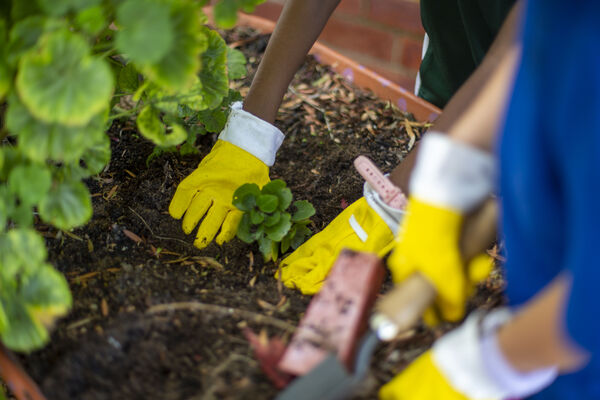Overview
Alignment with Be You Domains
-
Mentally Healthy Communities
-
Family Partnerships
-
Learning Resilience
-
Responding Together
Alignment with Early Years Learning Framework (EYLF)
- Children are confident and involved learners
- Children are connected with and contribute to their world
- Children are effective communicators
- Children have a strong sense of identity
- Children have a strong sense of wellbeing
Alignment with Australian Curriculum
- English
- Health and PE
- Humanities and Social Sciences
- Mathematics
- Science
- The Arts
Target audience
- Early learning
- Primary school
- Secondary school
Target groups
- Small group
- Whole class
- Whole school
Aims
The Kitchen Garden Program is a holistic program that aims to support children and young people's healthy physical, emotional, educational and social development. The program aims to improve school engagement and social connection for children, young people, their families and communities, enabling them to form positive food, health, sustainability and wellbeing habits for life.Program theory
The program's approach to health promotion through pleasurable food education harnesses the power of values-based messaging and positive psychology. The program is aligned with the Early Years Learning Framework, National Quality Standard and the Australian Curriculum. It is included on the Wellbeing panels of state education departments, and on ARACY's Wellbeing in Education panel for its demonstrated impact in all 6 domains of the Nest, Australia’s wellbeing framework for children and young people. The program is also aligned with the World Health Organization's Health Promoting Schools, the National Children's Mental Health and Wellbeing Strategy, and the National Preventive Health Strategy.Topics
The program aims to positively influence mental health and wellbeing by improving food literacy and behaviour; building life-long skills, confidence, agency and pride in achievements; supporting all types of learners to experience school success; increasing physical activity and the therapeutic benefits of green spaces and nature connection; and engaging students, families, and communities in school life thereby building social capacity and connection.Cost
Program structure
Educators deliver the program to children and young people through hands-on kitchen and garden experiences.Instructor
- Educator
- Wellbeing leader
Instructor training
Educator training is offered through a combination of online webinars and professional development sessions, ongoing one-on-one phone/online individualised support appointments and optional face-to-face workshops.Supporting resources or materials available with program
- Manual
- Online webinars
- Posters
- Workbook
- Other (please specify)
Other materials
Resource packs, an online members' portal and an online individualised support tool.Ongoing support
Training, guidance, support and educational resources are available throughout the course of the membership. Ongoing support is available for members and is offered at no extra cost via a dedicated support line, one-on-one phone/online scheduled support sessions, email or web forms. Schools may opt to participate in extra Professional Development sessions (in addition to those included in the membership) at approximately $45 per person, per session.Parent involvement
- Attend program sessions with child
- Online resources
Origin of program
Australia
Stephanie Alexander Kitchen Garden Foundation
Program authors
Stephanie Alexander Kitchen Garden Foundation
- PO Box 104,Abbotsford VIC 3067 Australia
Ratings
Summary of evidence factors
This is a summary of the evaluation or research study characteristics that contribute to the program’s evidence rating.
|
Positive impact on at least one outcome for children and/or young people?
The study reported positive outcomes. |
Yes |
|---|---|
|
Link between program description and theory of change
Theory of change refers to whether there was a comprehensive description and illustration of how and why a desired change is expected to happen in a particular context. |
Comprehensive |
|
Study design
Type of study design reported. |
Quasi-experimental |
|
Independence
The degree to which the program authors were involved in the research. |
Completely |
Summary of implementation factors
This is a summary of the program’s characteristics that contribute to its implementation rating.
|
Feedback sought from participants
Participants enjoyed the program and understood its benefits. |
Yes |
|---|---|
|
Feedback sought from instructors
Instructors enjoyed the program and understood its benefits. |
Yes |
|
Groups program is not suitable for
Groups the program wouldn't be suitable for or that required further research to determine suitability. |
Assessed and reported |
|
Training provided during study
The model of training provided. |
Face to face train-the-trainer in person |
|
Ongoing instructor support provided during study
Whether ongoing support is provided. |
Yes |
Context
This is a summary of the context in which the evidence for the program was established.
|
Study Participants
Pre school, primary school (Foundation to Year 6), secondary school (Years 7 to 12). |
Primary school |
|---|---|
|
Country of Study/s
The location in which the evidence or research was conducted. |
Australia |
|
Location of Study/s in Australia
The state (or states) the program was assessed in Australia. |
VIC |
|
Evaluation of program in culturally and linguistically diverse populations
Provider has included culturally and linguistically diverse people when assessing the program. |
Yes |
|
Evaluation of program in Aboriginal and Torres Strait Islander children and young people
Provider has included Aboriginal and Torres Strait Islander peoples when assessing the program. |
Yes |
|
Evaluation of program in low socioeconomic groups
Program has evaluated a diverse socio-economic population in their research. |
Yes |
|
Developmental based adaptations to program design and delivery
Shorter sessions for younger students or activities are adjusted for age appropriateness. |
Yes |
|
Evaluation of program in children and young people with disability and/or learning difference
Provider has included participants with a disability or learning difference when assessing the program. |
Yes |
Last updated: 8 July 2024
